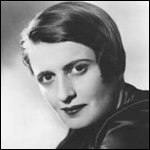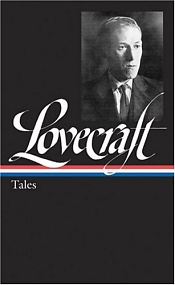Books Commentary: Trashy Modern Classics
More evidence bean counters will be picking the classics of the future: two novels by Ayn Rand – the unhinged saint of unbridled capitalism – have been reissued as Penguin Modern Classics.
By Bill Marx
Am I the only critic who finds the oxymoron “modern classic” a sleazy way for publishers to perfume stink bomb books with airs of respectability?
The hysterical saint of unbridled capitalism, the goddess of take-no-prisoners individualism, Ayn Rand, is now an author included in Penguin Modern Classics. Two of her long and unreadable novels, 1943’s The Fountainhead and 1957’s Atlas Shrugged, each starring an industrial-strength supermen staring down the craven underclasses, have been legitimized for classroom reading and serious discussion. Let’s see if any conservative reviewer notes that, once again, sales figures and ideological message-mongering thumps aesthetic value.
Reviewer Mark Crees does a nifty job taking down Rand’s epic wheezes in the July 22 issue of TLS:
At times it seems that Ayn Rand’s people are arguing about nothing but contracts and gas stations, and one can only wonder at her determination to see it all through to the end.

Still, literary taste strikes back, sometimes through the back door. In 2005, the Library of America added the ghastly horror writer H.P. Lovecraft to its lineup of the nation’s literary giants. I defy you to find a sensible or stylish sentence in his moronic stories, which feature monsters turning into puddles of ooze and giant whistling octopuses flying through space on “leathery wings.” Lovecraft’s prose blazes purple, to the point of terminal bruising.
He is my candidate for the rock bottom of the LoA barrel – his nearest competition is Charles Brockden Brown, who churned out logorrhetic and demented Gothic thrillers. Nobody but students of early nineteenth-century American literature read Brown. Lovecraft was an inspiration for contemporary bestselling writers, Stephen King and Clive Barker among them, so LoA figured that he would appeal to adolescent fans of tales of terror.
Next October, LoA is adding two volumes of criticism by Edmund Wilson, and in Literary Reviews of the 1930s & 1940s he nails Lovecraft:
The only real horror in most of these fictions is the horror of bad taste and bad art. Lovecraft was not a good writer. The fact that his verbose and undistinguished style has been compared to Poe’s is only one of the many sad signs that almost nobody anymore pays any real attention to writing.
Sweet…
Tagged: Ayn-Rand, Books, Charles-Brockden-Brown, Edmund-Wilson, HPLovecraft, Library-of-America, Penguin-Modern-Classics



Lovecraft is a bad writer, however, he is an interesting bad writer, and as a consequence, he has had an influence not only on pop ephemera, but also on good writers. He was one of the first pulp writers to emphasize such a strong anti-humanist view point in that he envisioned in his stories a world where humanity is quite insignificant. He could also, in the midst of his purple prose, introduce references to non-existent books in a manner that had a profound influence on his betters– notably Jorge Luis Borges, who often cited Lovecraft’s influence.